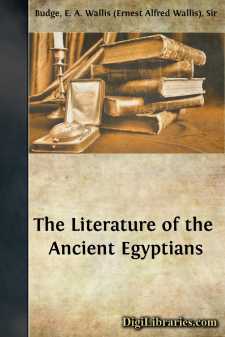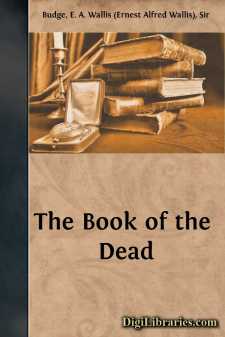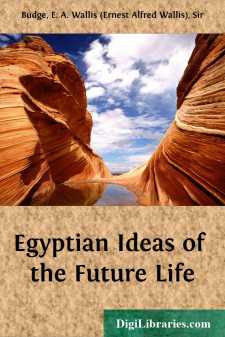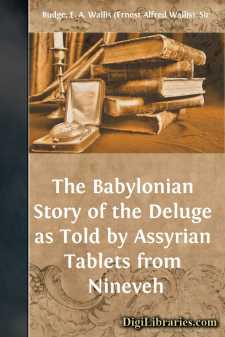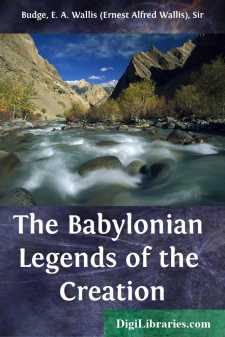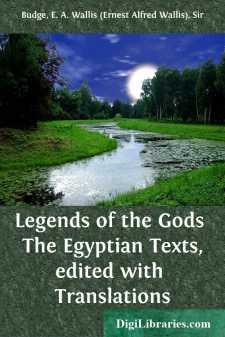Categories
- Antiques & Collectibles 13
- Architecture 36
- Art 48
- Bibles 22
- Biography & Autobiography 813
- Body, Mind & Spirit 142
- Business & Economics 28
- Children's Books 14
- Children's Fiction 11
- Computers 4
- Cooking 94
- Crafts & Hobbies 4
- Drama 346
- Education 46
- Family & Relationships 57
- Fiction 11829
- Games 19
- Gardening 17
- Health & Fitness 34
- History 1377
- House & Home 1
- Humor 147
- Juvenile Fiction 1873
- Juvenile Nonfiction 202
- Language Arts & Disciplines 88
- Law 16
- Literary Collections 686
- Literary Criticism 179
- Mathematics 13
- Medical 41
- Music 40
- Nature 179
- Non-Classifiable 1768
- Performing Arts 7
- Periodicals 1453
- Philosophy 64
- Photography 2
- Poetry 896
- Political Science 203
- Psychology 42
- Reference 154
- Religion 513
- Science 126
- Self-Help 84
- Social Science 81
- Sports & Recreation 34
- Study Aids 3
- Technology & Engineering 59
- Transportation 23
- Travel 463
- True Crime 29
The Literature of the Ancient Egyptians
Categories:
Description:
Excerpt
CHAPTER I
THOTH, THE AUTHOR OF EGYPTIAN LITERATURE.
WRITING MATERIALS, ETC.
The Literature of ancient Egypt is the product of a period of about four thousand years, and it was written in three kinds of writing, which are called hieroglyphic, hieratic, and demotic. In the first of these the characters were pictures of objects, in the second the forms of the characters were made as simple as possible so that they might be written quickly, and in the third many of them lost their picture form altogether and became mere symbols. Egyptian writing was believed to have been invented by the god Tehuti, or Thoth, and as this god was thought to be a form of the mind and intellect and wisdom of the God who created the heavens and the earth, the picture characters, or hieroglyphs as they are called, were held to be holy, or divine, or sacred. Certain religious texts were thought to possess special virtue when written in hieroglyphs, and the chapters and sections of books that were considered to have been composed by Thoth himself were believed to possess very great power, and to be of the utmost benefit to the dead when they were written out for them in hieroglyphs, and buried with them in their coffins. Thoth also invented the science of numbers, and as he fixed the courses of the sun, moon, and stars, and ordered the seasons, he was thought to be the first astronomer. He was the lord of wisdom, and the possessor of all knowledge, both heavenly and earthly, divine and human; and he was the author of every attempt made by man to draw, paint, and carve. As the lord and maker of books, and as the skilled scribe, he was the clerk of the gods, and kept the registers wherein the deeds of men were written down. The deep knowledge of Thoth enabled him to find out the truth at all times, and this ability caused the Egyptians to assign to him the position of Chief Judge of the dead. A very ancient legend states that Thoth acted in this capacity in the great trial that took place in heaven when Osiris was accused of certain crimes by his twin-brother Set, the god of evil. Thoth examined the evidence, and proved to the gods that the charges made by Set were untrue, and that Osiris had spoken the truth and that Set was a liar. For this reason every Egyptian prayed that Thoth might act for him as he did for Osiris, and that on the day of the Great Judgment Thoth might preside over the weighing of his heart in the Balance. All the important religious works in all periods were believed to have been composed either by himself, or by holy scribes who were inspired by him. They were believed to be sources of the deepest wisdom, the like of which existed in no other books in the world. And it is probably to these books that Egypt owed her fame for learning and wisdom, which spread throughout all the civilised world. The "Books of Thoth," which late popular tradition in Egypt declared to be as many as 36,525 in number, were revered by both natives and foreigners in a way which it is difficult for us in these days to realise....


